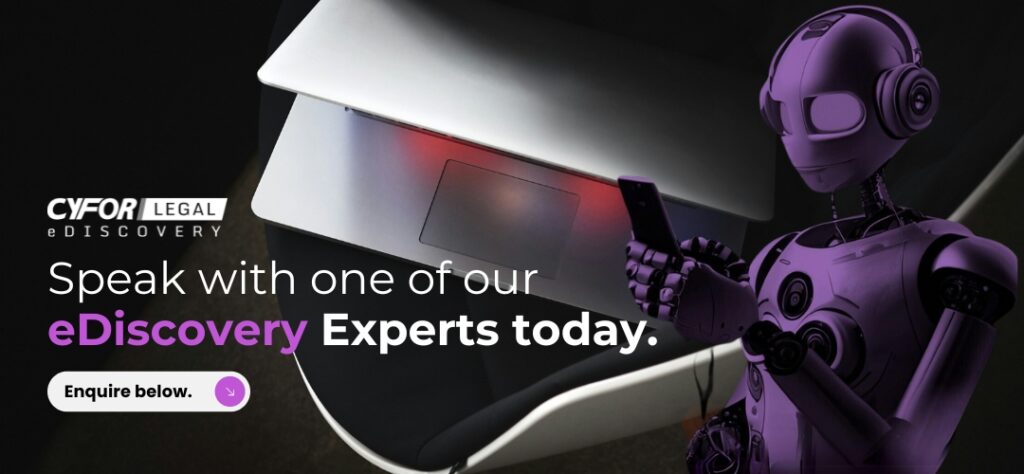Our FAQs
Below, you’ll find answers to the most common questions about eDiscovery and CYFOR Legal. For more information, feel free to visit our LinkedIn and Twitter accounts. If you can’t find the answer you’re looking for, please don’t hesitate to contact us directly.
What is eDiscovery?
eDiscovery, short for electronic discovery, is the process of finding, collecting, and analysing electronic information such as emails and documents for legal cases or investigations. This digital data is important evidence, and the process involves steps like identifying sources, preserving data integrity, collecting relevant information, reviewing and analysing it, and presenting it in legal proceedings. Moreover, specialised document review tools and platforms are often used to manage the large amount of electronic data involved.
eDiscovery may also be referred to as; eDisclosure, e-disclosure, e-discovery, ediscovery or e-Discovery.
What is a DSAR?
A DSAR, or Data Subject Access Request, is a legal right that lets individuals request for organisations to release details about their personal data. It allows people to understand how their data is used and processed, with organisations having to respond within a 30-day time frame. DSARs promote transparency and control over personal information, as part of Article 13 within the GDPR act.
Why is eDiscovery important?
eDiscovery is important because it helps collect, organise, and present electronic evidence (ESI) in legal cases and investigations. Additionally, it streamlines processes for those involved, ensures compliance, and promotes transparency alongside fairness, especially in our data-driven world. The process of eDiscovery ultimately allows legal professionals to reduce costs and project time scales.
How does eDiscovery work?
The process of eDiscovery is formed off the back of a system called the EDRM or electronic discovery reference model. This model encapsulates the entire eDiscovery process from start to finish. As seen by the edrm.net, the latest model highlights the process as follows.

Who are CYFOR Legal?
CYFOR Legal is CYFOR’s dedicated eDiscovery division, providing end-to-end solutions and litigation support to legal professionals. Our team has provided specialist digital forensic and eDiscovery services for over 20 years. However, the eDiscovery division of CYFOR offers such a unique service to a completely different spectrum of clientele. The decision was made to take advantage of this situation and launch a dedicated offering. From this, CYFOR Legal was created.
What accreditations and certifications does CYFOR Legal have?
Our accreditations and certifications are a testament to our dedication to providing the highest level of service and security to all clients and stakeholders here at CYFOR Legal.
ISO 27001:2022 Certified
- The CYFOR Legal team is certified with ISO 27001, which is an internationally recognised framework for best practice in Information Security Management System (ISMS). We understand the need for appropriate controls in risk management when dealing with important information. The ISO 27001 standard sets the requirement for ISMS certification and covers best security practices to effectively manage the integrity of information assets, confidentiality and the minimizing of information security risks.
ISO 9001:2015 Certified
- CYFOR Legal is ISO 9001 certified, which is a best practice management framework. The attainment of ISO 9001 compounds our dedication to providing the highest level of customer service and satisfaction while encouraging best practices and compliance for continued business improvement across all levels.
ISO 17025:2017 Certified
- ISO 17025 is the international standard for general requirements for the competence of testing and calibration laboratories (including digital forensic laboratories) and is awarded by the United Kingdom Accreditation Service (UKAS). This international ISO 17025 standard is applicable to any laboratory regardless of size or the extent of the scope of testing and calibration practices. It’s employed by laboratories to develop their management system for quality, body, and technical operations.
Cyber Essentials Plus
- The Cyber Essentials scheme has been developed by Government and industry to fulfil two functions. It provides a clear statement of the basic controls all organisations should implement to mitigate the risk from common internet-based threats, within the context of the Government’s 10 Steps to Cyber Security.

What are the benefits of instructing a boutique eDiscovery vendor?
Working alongside CYFOR Legal’s expert team grants you access to knowledge unlike no other. And here you gain direct access to the member of the team that you require, bypassing the age-old hassle of going ‘round the houses’. At CYFOR Legal we pride ourselves on providing our clients with a one-on-one experience, when you work with our team you meet everyone involved.
How can I prevent a Data Breach?
Although we cannot advise on how to combat a data breach, we can give our guidance:
- Store personal data securely
- Have a clear desk policy
- Have a remote working policy
- Keep your address book up to date
- Name your documents clearly and consistently
- TAKE CARE WHEN REDACTING DATA
- Train your staff
- Instil an appropriate data breach process
- Back up your system
- Secure your network parameter
- Encrypt all accessible data.
What is eDisclosure?
Electronic disclosure (more commonly known as eDisclosure) is the ‘disclosure’ of electronically stored information (ESI). It involves the efficient management of ESI within litigation and is a specific term used in the Civil Procedure Rules of England and Wales. Due to the exponential volume of data held in electronic format, eDisclosure is a vital stage in a dispute. The electronic data is searched, identified, and preserved. All for the purpose of using it as admissible evidence in a civil matter.
What are the benefits of eDiscovery?
Enhancing the process of eDiscovery leads to a plethora of benefits for the legal individual involved, including:
- Improved efficiency
- Reduction in costs or timeframes
- Early identification of key documents and issues
- Increased accuracy and quality of review
- Better information – lower risk of missing your smoking gun
- Privacy protection and regulation compliance
- Ease in transfer of data
- Industry leading and trusted review tools
- Manageable data sources/quantities.
What are the costs of eDiscovery?
Our eDiscovery costs encompass expenses related to identifying, collecting, processing, reviewing, and producing electronic data for legal purposes. These include investments in technology and software, data collection and processing, hosting and document review by legal professionals. Hiring experts, project management, legal hold implementation, production of documents, training, data security is all essential also.
Cost Extent
The extent of these costs depends on factors such as case complexity, data volume, technology, and jurisdictional requirements. Effective planning and technology used can help manage these expenses. Additionally, the team at CYFOR Legal offers the ability to instruct gigabytes, fixed price and varying models also. We ultimately aim to create a process that is best suited to you.
Forensically capturing data the correct way
CYFOR Legal understands the critical nature of forensically imaging. Both for digital devices and collecting sensitive data in cases where investigations or disclosure may be required. Capturing this data using a forensically sound methodology is vital if the integrity of any subsequent investigation is to be maintained. Our team operates globally, often travelling at short notice to ensure that a complete set of onsite data is recovered. Our fully qualified digital forensic experts are no strangers to complex global data extractions. Across the full spectrum of digital devices and under time-restrictive deadlines.
From the first point of instruction, CYFOR Legal provides a bespoke workflow. In order to collate all the data in a forensically sound manner, while advising on the best technical strategies, using the latest software. Additionally, we ensure all relevant data sources have been identified and mapped out prior to forensically acquiring, analysing, and reporting digital evidence.
How does document de-duplication work?
De-duplication scans all the data blocks in the dataset and eliminates any present duplicates by comparing fingerprints of the blocks and by doing a byte-by-byte comparison to eliminate any false positives. This procedure also ensures that there is no data loss during the deduplication operation.
What document review technology does CYFOR Legal utilise? - Industry leading trusted document review tools
As powerful and indispensable tools in the eDiscovery process, CYFOR Legal heavily invests in the latest document review technologies. All whilst ensuring the provision of the highest quality service to clients. Additionally, they allow for the effective management of vast amounts of electronically stored information (ESI) in commercial litigation, dispute resolution, and investigations. While drastically reducing costs.
Our premium eDiscovery technology is Relativity. An end-to-end, web-based platform servicing every part of the eDiscovery life cycle. As a customisable platform, it enables case teams to create basic workflows from small, simple reviews to the largest, most complex projects. Whilst being housed in a highly scalable environment. With a full range of advanced data analytics and search technology, Relativity helps visualise patterns in data and investigate trends. These features improve review speed and lets reviewers quickly identify key issues. From legal hold through production, including Early Case Assessment (ECA), Relativity provides all the tools necessary to tackle an investigation and a full range of review challenges.


